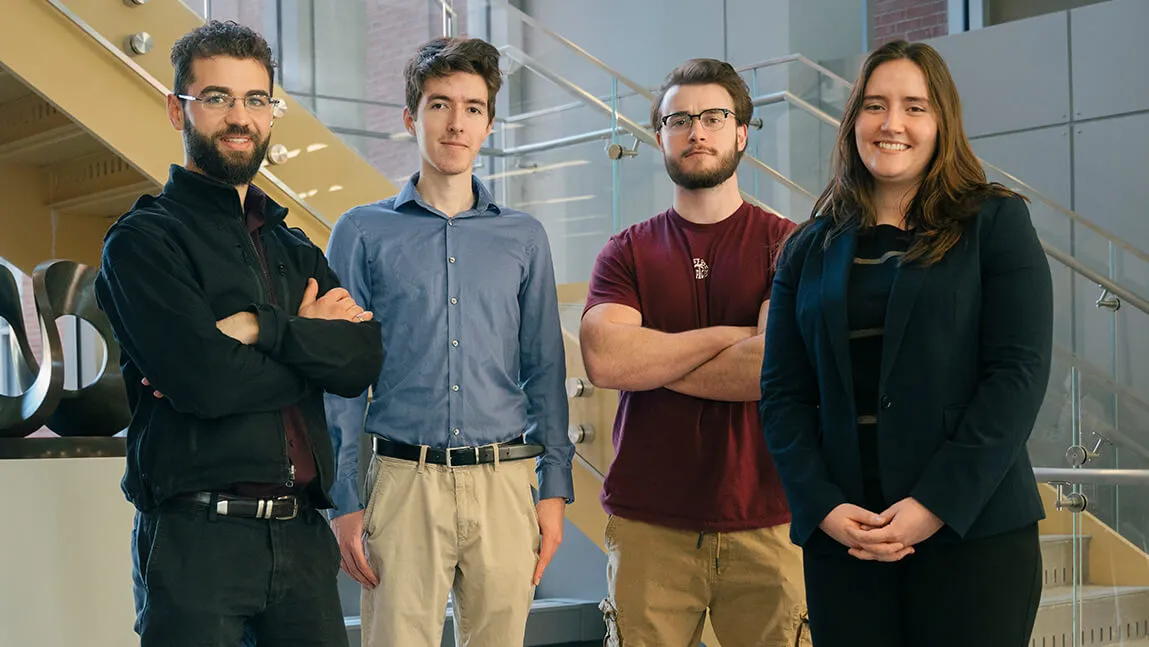These four students would enjoy telling you what they were doing for a week—feverishly working as a team, solving complex technical problems, making presentations to senior engineers and business leaders in major corporations, inventing…things.
But they can’t.
Except to say that one of their solutions was a flying car. And that they won—taking first prize in the international Engineering and Commerce Case Competition, ENGCOMM, hosted by Concordia University in late February, competing against other undergraduate teams from around the world.
“It’s not theoretical,” explains senior Will Jeffries ‘22, a mechanical engineering major in the College of Engineering and Mathematical Sciences. “These are actual problems, being brought by real companies who are looking for solutions.” In the fierce and heady world of new product development, gaining the imaginative insight of talented young people can be a powerful advantage for companies—but they also want to protect their intellectual property and place in the market.
“The judges are typically C-suite executives from the companies that present a case, a live problem they’re working on—or the case is adjacent to their real problem,” says Ken Burkman, the team’s coach and UVM professor of practice in engineering management. “So there is an element of confidentiality in the specifics about what they're asking students to investigate.” Hence, the semi-secret nature of the contest.
“It was just the four of us, together, for two six-hour competitions and then a final twelve-hour competition, using our brains to come up with a solution,” says senior Olivia Mead, an environmental engineering major. Working remotely from a UVM classroom, “we were not allowed to leave except for five-minute bathroom breaks.”
One second
In those three rounds of competition, the UVM students excelled over teams from Canada, Egypt, Ireland, and other countries, taking not just the top overall prize, but five other prizes including best business solution, best engineering solution, best team chemistry—and best presenter, given to Joe Consorti, a senior in UVM’s Grossman School of Business.
In the team’s four presentations to the judges, they had exactly fifteen minutes—going over would result “in a stiff penalty,” said Ken Burkman. Consorti was able to not only impress the panel, but also finish the team’s presentations with “literally one second left,” said Burkman.
“I can talk to any audience, whatever comprehension level, within a given timeframe. That’s what consulting is,” says Consorti, who has lined up a job as a consultant with a private equity placement group after he graduates in May. “And that’s the essence of this competition too: you need a great solution—we brought the hard skills, especially our environmental understanding—and great communication to make our solution clear and palatable.”
“I can speak vaguely to what we did in the competition: some of the cases asked us to develop regenerative energy solutions for a community of the future, think Walt-Disney-1965-house-of-the-future-esque stuff—brought into the modern day,” he says. “And in the final case we developed our solution as a flying car.”
Brains to the limit
And it’s that intersection between engineering and business that makes the student-led ENGCOMM competition different than many of the other case competitions familiar to business students. “We do cases and presentations all the time,” says Connor McCormack ’22, a finance major in the Grossman School. “But working the bridge between engineering and business adds complexity and a lot of real-world challenge—this was the most fun I’ve had at a case competition; we’re a great team.” The judges, he says, were less interested in the details of the solutions the UVM students developed—"and more interested in how we came about our solution,” he says—closely interrogating the students’ reasoning on what they prioritized, their financial and engineering rationales, and their timelines.
“If you've ever wanted to focus very, very heavily on something and really tried to push your brain to the absolute limits—this is the place to do it,” says Joe Consorti.
“They didn't want us downloading the case materials,” Will Jeffries says, “but the judges were great, very knowledgeable—and one of them even offered me a job interview afterwards.”
